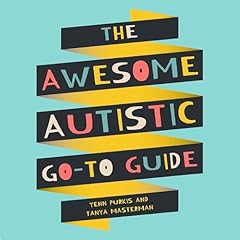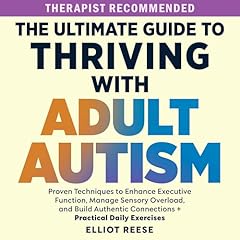
The Reason I Jump
The Inner Voice of a Thirteen-Year-Old Boy with Autism
No se pudo agregar al carrito
Add to Cart failed.
Error al Agregar a Lista de Deseos.
Error al eliminar de la lista de deseos.
Error al añadir a tu biblioteca
Error al seguir el podcast
Error al dejar de seguir el podcast
Prueba gratis de 30 días de Audible Standard
Compra ahora por $12.20
-
Narrado por:
-
Tom Picasso
You've never listened to a book like The Reason I Jump. Written by Naoki Higashida, a very smart, very self-aware, and very charming thirteen-year-old boy with autism, it is a one-of-a-kind memoir that demonstrates how an autistic mind thinks, feels, perceives, and responds in ways few of us can imagine. Parents and family members who never thought they could get inside the head of their autistic loved one at last have a way to break through to the curious, subtle, and complex life within. Using an alphabet grid to painstakingly construct words, sentences, and thoughts that he is unable to speak out loud, Naoki answers even the most delicate questions that people want to know. Questions such as: "Why do people with autism talk so loudly and weirdly?" "Why do you line up your toy cars and blocks?" "Why don't you make eye contact when you're talking?" and "What's the reason you jump?" (Naoki's answer: "When I'm jumping, it's as if my feelings are going upward to the sky.")
With disarming honesty and a generous heart, Naoki shares his unique point of view on not only autism but life itself. His insights - into the mystery of words, the wonders of laughter, and the elusiveness of memory - are so startling, so strange, and so powerful that you will never look at the world the same way again.
©2007 Naoki Higashida (P)2013 Recorded BooksLos oyentes también disfrutaron:




















Las personas que vieron esto también vieron:


















Another reminder that there are multiple ways to experience the world. Too often it seems that we have boundaries and expectations about what it means to be normal. Not all of us see the dress as Blue/Black or White/Gold. Some of us can feel the dress and some of us don't see anything at all. The more tolerant and understanding we become of the diversity of people, I believe, the better the experience we have on this blue rock will be.
An insightful glimpse into mind of an autistic child
Se ha producido un error. Vuelve a intentarlo dentro de unos minutos.
Autism is a gift.
Se ha producido un error. Vuelve a intentarlo dentro de unos minutos.
If you could sum up The Reason I Jump in three words, what would they be?
compassionate, compelling, illuminatingWhat was one of the most memorable moments of The Reason I Jump?
When he describes people with autism as being "primordial, from a past world". Just beautifulWhat about Tom Picasso’s performance did you like?
heartfelt!Did you have an extreme reaction to this book? Did it make you laugh or cry?
I felt so many strong emotions as listened to this book. It was really life changing for me.I couldn't stop listening.
Se ha producido un error. Vuelve a intentarlo dentro de unos minutos.
What did you love best about The Reason I Jump?
The story was fascinating to hear. It gave me some insight into how at least this autistic person deals with life.Very informative!
Se ha producido un error. Vuelve a intentarlo dentro de unos minutos.
Amazing
Se ha producido un error. Vuelve a intentarlo dentro de unos minutos.


